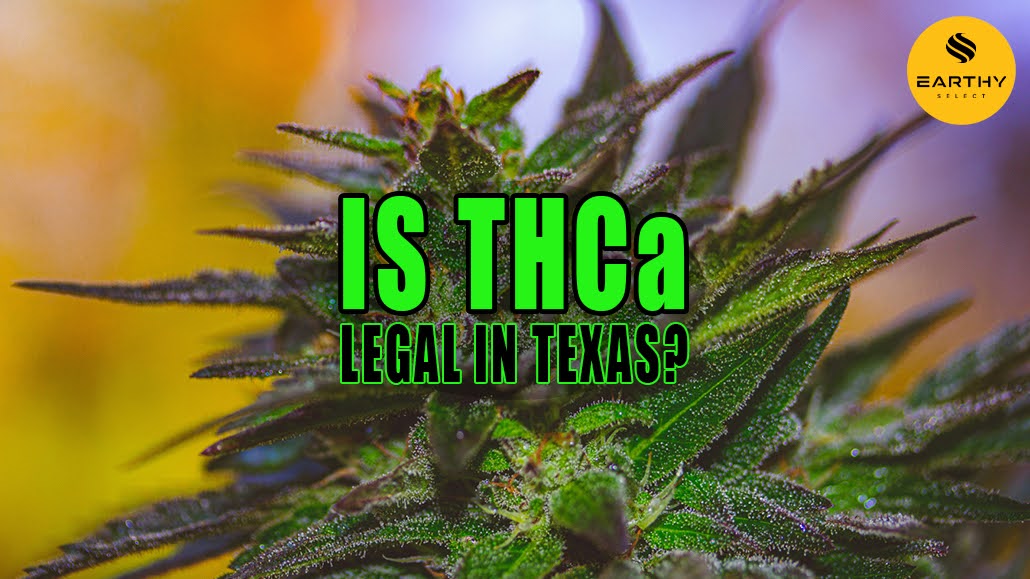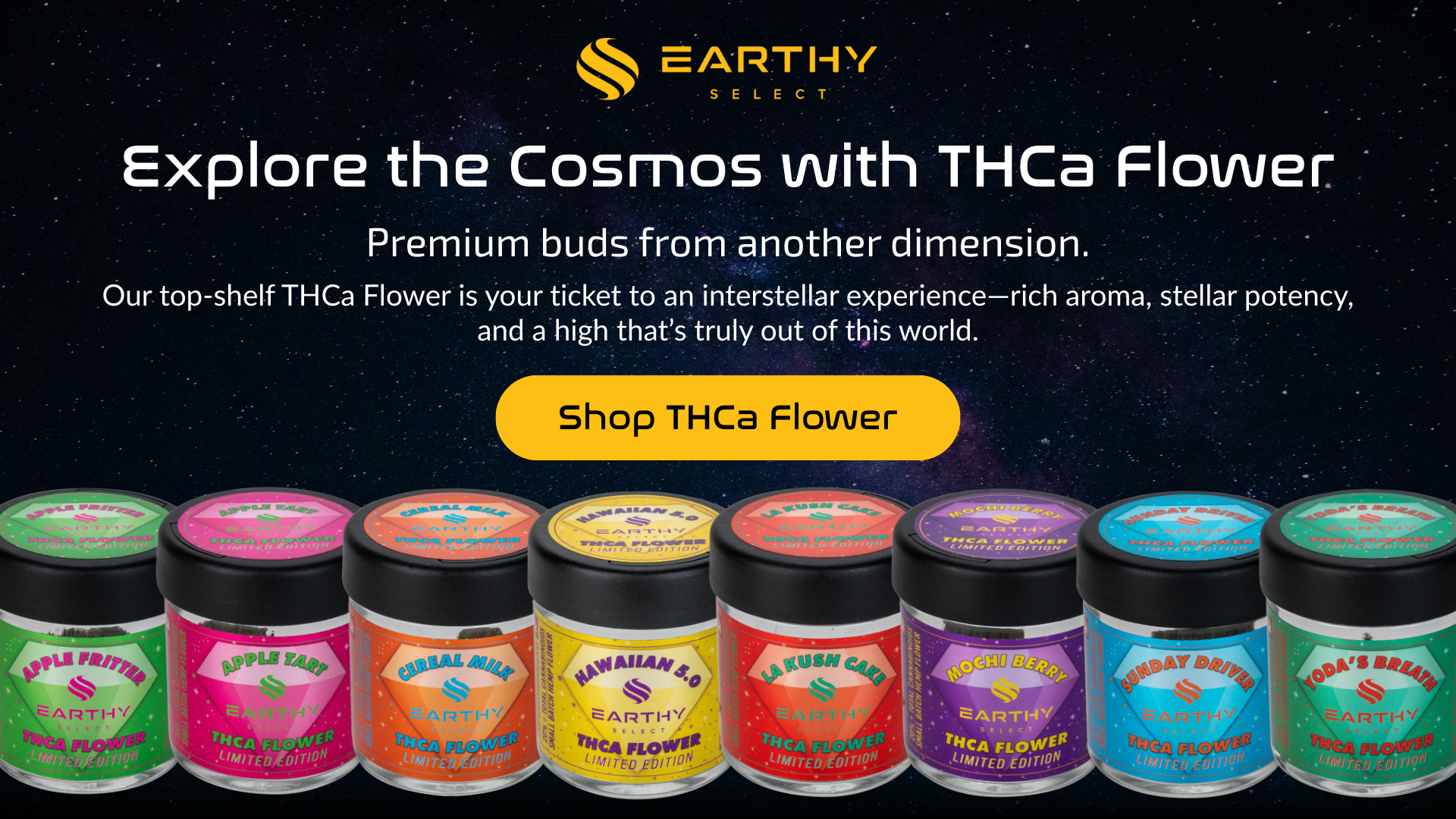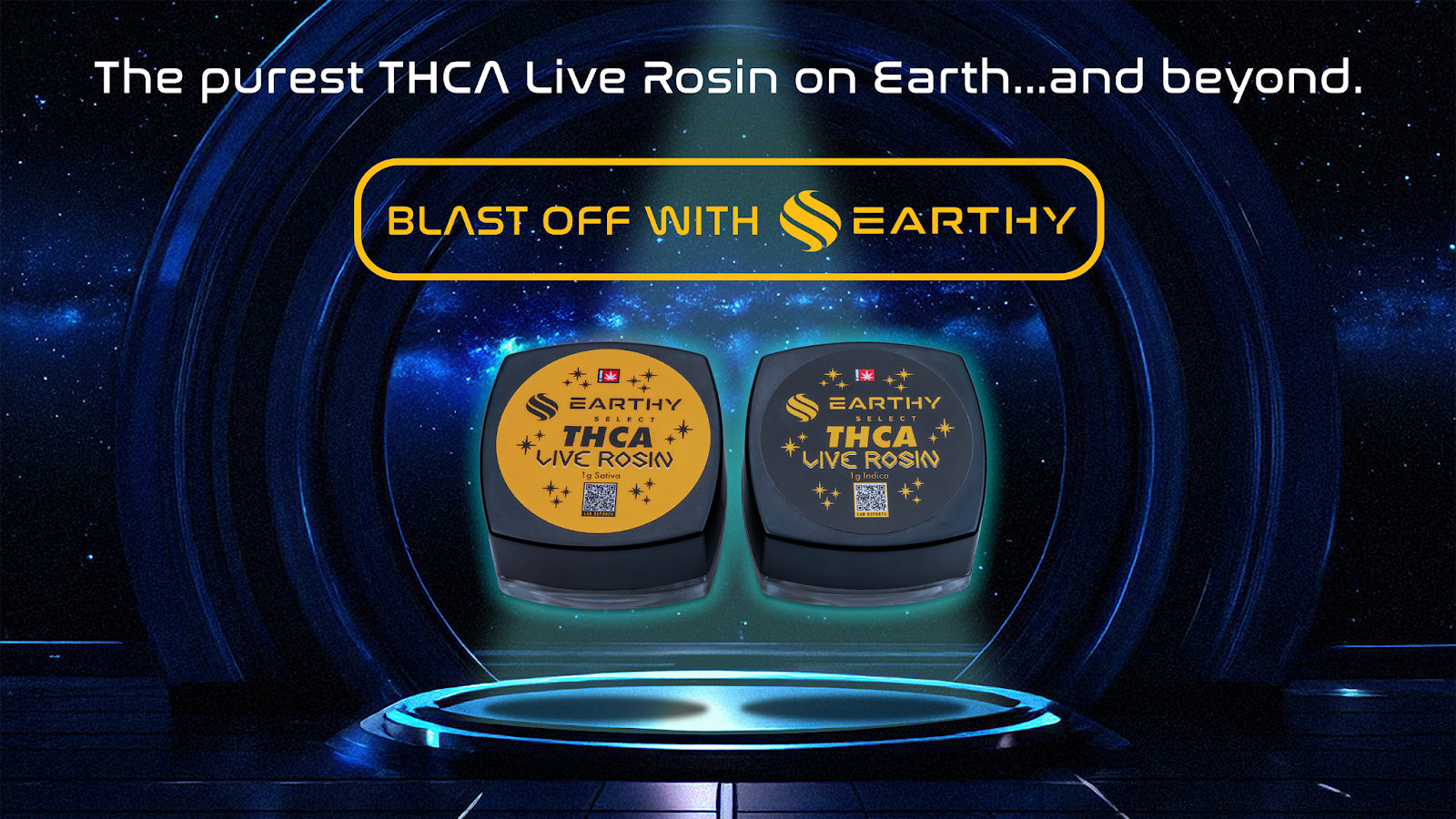Is THCa Legal in Texas? What You Can (and Can’t) Do
Key Takeaways:
- THCa’s legal status in Texas is murky, with federal hemp laws allowing it under 0.3% Delta-9 THC, but state enforcement remains unpredictable and strict.
- The 2018 Farm Bill legalized hemp and its derivatives, but Texas’s own laws and local interpretations create a complex landscape for THCa users and sellers.
- Consumers must demand transparency and third-party lab testing for THCa products to ensure compliance and safety, given the lack of clear state guidance.
THCa—the non-intoxicating cannabis compound that becomes Delta-9 THC when heated—is causing a stir in Texas. While the Lone Star State keeps a tight rein on marijuana, THCa occupies a hazy position within its legal framework.
At Earthy Select, we’re in the thick of this debate, ensuring our organically grown THCa Flower not only meets quality standards but also fits within the maze of state and federal laws. Through DEA-registered lab tests, our products adhere to the US Farm Bill, providing you with peace of mind to “Select Your Adventure” with us.
In Texas, where the rules around marijuana use are rather stringent, understanding THCa’s legal status is crucial. This brief exploration aims to shed light on THCa’s scientific background, its legal standing in Texas, and what is permissible for its use. Remember, the conversation around THCa is about more than the pursuit of a high—it’s about navigating the complex intersection of cannabis science and law.
The Legal Status of THCa in Texas
The legal standing of THCa flower in Texas can be challenging to pinpoint. Under the 2018 Farm Bill, hemp derivatives containing 0.3% Delta-9 THC or less are federally permissible, which appears to include THCa in its unprocessed form. However, Texas often applies a more cautious interpretation. If THCa is heated and transforms into THC, it may be regarded similarly to marijuana, which remains prohibited for recreational use in the state. Notably, Texas law does not provide explicit guidance on THCa specifically, leaving room for varied interpretations by local authorities and prosecutors. As such, while THCa is not inherently psychoactive or expressly banned, possessing THCa products could potentially lead to complications due to its association with THC. This tension between federal allowances and Texas’s conservative approach places THCa in an ambiguous legal space [1].
Federal vs. State Laws on THCa
Understanding THCa’s legality in Texas often feels like navigating a complex puzzle. The 2018 Farm Bill established federal permission for hemp derivatives with 0.3% Delta-9 THC or less, placing THCa in an undefined category since it is non-psychoactive in its raw form. As a result, this federal framework offers a starting point, though it is not the final determinant in Texas.
In 2019, Texas enacted House Bill 1325 to align with federal hemp guidelines, yet in practice, the state tends to interpret these regulations with greater scrutiny. While there is no direct prohibition on THCa, the lack of clarity in state law and enforcement practices means that THCa products may still attract attention, particularly if authorities suspect potential conversion to THC. Also, disparities in testing standards between federal and Texas protocols further complicate matters, as a product meeting federal THC limits might still raise concerns at a local level. This creates an environment where both consumers and retailers are advised to proceed with care, remaining mindful of the potential legal considerations in a state known for its stringent cannabis policies [2].
Federal Law: The 2018 Farm Bill
The 2018 Farm Bill marked a significant shift in the U.S. cannabis industry by removing hemp—defined as cannabis with 0.3% Delta-9 THC or less—from the list of controlled substances. This opened the door for a wide range of hemp-derived products to enter the market. However, the law does not specifically address compounds like THCa, which can convert to THC when heated, leading to ongoing discussions about compliance. Federal guidelines mandate that hemp products contain no more than 0.3% Delta-9 THC, and the USDA requires testing for “total THC,” which accounts for potential THC from THCa after decarboxylation. This presents a challenge for producers to ensure consistent compliance with cannabinoid levels [3].
The relationship between federal permissions and state authority, particularly in a state like Texas, adds layers of complexity to the cannabis landscape. States are permitted to enforce stricter regulations, which underscores the ongoing tension between federal provisions and local implementation in the dynamic field of cannabis policy.
State Law: Not So Fast, Texas Style
Navigating THCa’s legal framework in Texas requires careful attention. Although the 2018 Farm Bill federally endorsed hemp products with THC content 0.3% or below, Texas maintains a more reserved stance. House Bill 1325, enacted in 2019, aligns with federal hemp guidelines in theory, yet practical application often reveals a more stringent perspective.
Texas law enforcement is widely recognized for its firm approach to anything resembling cannabis. Moreover, current testing methods may struggle to differentiate between THCa and Delta-9 THC, and without specific state directives, possessing or using THCa could potentially lead to legal misunderstandings. While it may be permissible under federal hemp regulations, the reality of enforcement can vary significantly. For example, encountering THCa during a routine interaction with authorities could raise questions if there is suspicion of intent to convert it to THC. Individuals in Texas handling THCa are advised to exercise caution, ensuring they have documentation of compliance and remain aware that state practices may differ from federal allowances [4][2].
The Bottom Line
In Texas, the legality of THCa ultimately remains uncertain. The 2018 Farm Bill allows hemp-derived substances with 0.3% Delta-9 THC or less, and THCa meets this criterion in its raw state. However, once it is heated and transforms into THC, potential issues may arise. Texas legalized hemp in 2019 but upholds strict cannabis regulations, leaving THCa users in an unclear position. Lab testing often faces challenges in distinguishing THCa from THC, which could expose individuals to legal considerations despite federal compliance. With state enforcement practices varying, consumers may find themselves navigating a delicate balance between federal permissions and local interpretations [5].
Current Discourse and Upcoming Legislation on THCa
In Texas, discussions surrounding THCa are gaining attention. Under the 2018 Farm Bill, THCa derived from hemp with 0.3% Delta-9 THC or less is federally permissible. However, some Texas officials express concern about its potential to convert into psychoactive THC when heated. Scientifically, THCa in its raw form is not intoxicating, yet enforcement actions may not always account for this distinction.
As of mid-2025, legislative discussions in Texas are gaining prominence. Following Governor Greg Abbott’s veto of a proposed THC ban in May 2025, a special legislative session has renewed efforts to regulate or restrict hemp-derived products [4]. Senate Bill 5, under discussion in July 2025, proposes to prohibit products with any detectable amount of THC or other cannabinoids, establishing criminal penalties for possession of non-compliant hemp-derived items. This initiative, supported by Lt. Gov. Dan Patrick, contrasts with public opinion, as recent surveys indicate that a significant portion of Texans—around 68%—favor some level of cannabis legalization. Meanwhile, the Texas hemp industry, estimated to be worth over $8 billion by the Texas Hemp Coalition, faces potential economic impacts if stricter regulations are enacted. The outcome of this special session could significantly shape the future of THCa in the state [6][7].
How to Stay Informed About THCa Laws in Texas
Keeping abreast of THCa laws in Texas can be a demanding task, yet it is essential for maintaining compliance. Begin by monitoring updates from Texas regulatory entities such as the Department of Public Safety and the Department of State Health Services. Setting up notifications for terms like “THCa Texas law” through tools like Google Alerts can help you stay informed of relevant developments.
For those who find legal terminology challenging, consider turning to expert resources. Cannabis law blogs and legal firms with a focus on hemp often distill complex regulations into practical guidance, helping to clarify the current landscape and avoid potential missteps.
Engaging with advocacy organizations such as Texas NORML or the Hemp Industries Association can also be beneficial. These groups are often among the first to receive updates on legislative changes and provide platforms for addressing specific concerns. Additionally, local online communities may offer insights into enforcement patterns across different Texas counties, though such information should always be verified against credible sources.
Staying informed about THCa laws in Texas requires ongoing diligence. By utilizing a range of resources and connecting with relevant communities, individuals can better navigate the evolving regulatory environment and remain compliant.
Consumer Rights When Purchasing THCa
When exploring THCa flower in Texas, a clear understanding of legal considerations is vital. It’s important to note that THCa products derived from hemp must contain no more than 0.3% Delta-9 THC to align with the 2018 Farm Bill. Requesting Certificates of Analysis (COAs) to verify a product’s compliance is a prudent step. Without a COA, it may be wise to reconsider a purchase.
Safety remains a key concern. Consumers are entitled to THCa products free from contaminants such as pesticides and heavy metals. Reputable vendors typically provide detailed lab results upon request. But keep in mind, Texas’s position on THCa is nuanced—it is not explicitly prohibited, yet it is not universally accepted. Thus, attention to product marketing and seller licensing is advised. While consumers have the right to make purchases, staying informed about regulatory details offers the best protection in this evolving landscape.
Transparency is Non-Negotiable
Within the intricate framework of Texas cannabis regulations, clarity is paramount. For example, consumers need access to comprehensive information about THCa, not only regarding its legal status but also concerning its composition. This focus on transparency extends beyond effects to encompass safety and quality. Given THCa’s ambiguous legal standing, consumers should only consider products backed by third-party testing. These tests verify cannabinoid content and ensure the absence of harmful substances. Without such assurances, there may be risks to potency, purity, and compliance with legal requirements.
Texas maintains a notably strict stance on cannabis regulations. The distinction between permissible THCa and a product that raises concerns can be subtle, and overlooking this could lead to unintended consequences. Without verifiable documentation—such as lab reports and sourcing information—consumers face potential challenges. Staying informed, seeking reliable data, and prioritizing transparency are key steps to protecting both personal interests and the broader Texas cannabis community.
Federally Compliant, State Specific
Navigating THCa flower in Texas involves understanding a multifaceted legal environment where federal guidelines, state regulations, and individual rights intersect. At the federal level, THCa occupies an ambiguous space under the 2018 Farm Bill, which legalized hemp and its derivatives provided Delta-9 THC content does not exceed 0.3% on a dry weight basis. Scientifically, THCa is a non-psychoactive precursor to THC and is not explicitly classified under the Controlled Substances Act—unless heated and converted into Delta-9 THC. This transformation point underscores the importance of lab testing for cannabinoid content as a critical measure of compliance [3].
In Texas, the situation is further complicated. Since the passage of House Bill 1325 in 2019, the Department of State Health Services has been addressing hemp-derived products, aligning with federal standards but allowing for varied local interpretations. Enforcement practices can differ significantly across counties, with some areas potentially overlooking THCa while others might scrutinize THCa flower if conversion to THC is suspected. Without uniform statewide guidance, consumers often find themselves navigating a patchwork of local policies [2].
Right to Privacy
Privacy considerations are also noteworthy. Texas law does not specifically protect personal use of hemp-derived products from scrutiny, particularly in public settings or during interactions with law enforcement. Field tests may struggle to differentiate between legal THCa and prohibited THC, which could result in temporary complications while laboratory analysis clarifies the substance. This presents an additional layer of uncertainty for consumers [2].
No Age? No Sale
Age restrictions are a firm requirement. Texas adheres to federal standards, prohibiting the sale of hemp products to individuals under the age of 21. Trustworthy retailers typically enforce this through ID verification during in-store purchases. Vendors failing to comply with this standard may be operating outside of legal guidelines, potentially placing consumers at risk.
Returns & Recourse
Addressing recourse is equally important. If a purchased batch of THCa flower does not meet potency expectations or raises safety concerns, dependable vendors should offer return policies or mechanisms to resolve issues, supported by third-party lab results for verification. Without testing from ISO-accredited or DEA-registered labs, quality assurance remains uncertain. Texas currently lacks a comprehensive consumer protection framework for hemp products, making it crucial to select sources that prioritize transparency over expedience. This approach helps ensure safety and reliability in purchases.
Final Thoughts
Understanding Texas’s THCa regulations may seem daunting, yet it is manageable with careful consideration of federal and state guidelines. Brands like Earthy Select provide a reliable path forward by offering hemp-derived products such as THCa Flower in Texas that meet legal standards. Through sourcing from organic farms and conducting thorough lab testing, they uphold quality and compliance. With offerings like their THCa Flower, featuring 20-30% total cannabinoids, users can identify options suited to their preferences while staying within legal boundaries. Rely on Earthy Select to navigate Texas’s cannabis environment, whether you’re exploring THCa Sativa Strains, THCa Indica Strains, or seeking to understand What Is THCa?. Begin your confident and responsible exploration of THC-related products with us.
Read more:
Frequently Asked Questions About THCA Legality in Texas
Is THCa considered a controlled substance in Texas?
THCa is not explicitly classified as a controlled substance in Texas. Under the 2019 Texas hemp law, which aligns with federal standards, THCa from products within the 0.3% Delta-9 THC limit, such as those offered by Earthy Select, is generally regarded as permissible. However, enforcement may occasionally conflate THCa with THC without precise testing, which could introduce legal uncertainties [2].
How does THCa differ from THC?
THCa is the unprocessed, non-intoxicating precursor to THC present in raw cannabis. It does not produce psychoactive effects and may offer potential benefits, unlike THC, which becomes active when heated [2]. Earthy Select’s THCa Flower, rich in cannabinoids, adheres to legal THC thresholds as it remains unconverted to THC.
Are there any restrictions on the use of THCa in Texas?
THCa is permissible in Texas when derived from hemp containing no more than 0.3% Delta-9 THC, though evolving regulations and enforcement practices may present challenges. Legislative proposals in 2025 could introduce tighter restrictions or prohibitions, making it important to stay informed of updates [6].
Does Texas law differentiate between THCa and THC?
Texas law does not distinctly separate THCa from THC, focusing primarily on Delta-9 THC content. However, products with high THCa could raise concerns if converted to THC beyond legal limits. While Earthy Select follows legal standards, consumers should remain aware of potential interpretations by law enforcement [4].
Are THCa oils and tinctures legal in Texas?
THCa oils and tinctures may be permissible in Texas if they are hemp-derived and contain less than 0.3% Delta-9 THC. Choosing products from brands like Earthy Select, which emphasize rigorous lab testing and accurate labeling, can help ensure compliance with legal standards.
Are dispensaries allowed to sell THCa in Texas?
Texas allows the sale of hemp-derived THCa through retailers provided it remains under the THC threshold, distinct from medical dispensaries which operate under stricter controls. For compliant and quality options, companies like Earthy Select primarily serve customers online or through select retail locations.
What age do you have to be to purchase THCa in Texas?
Individuals must be 21 or older to purchase hemp-derived THCa products in Texas [3]. Earthy Select implements age verification processes to ensure responsible access to their “Select Your Adventure” craft cannabis offerings.
Are there legal limits to the amount of THCa you can possess in Texas?
Texas does not specify possession limits for compliant THCa products, though holding large quantities might attract scrutiny regarding intent to distribute. With Earthy Select, transparency in products and lab reports offers additional reassurance for personal use. Proper storage and maintaining documentation can be helpful if questions arise.
Medical Disclaimer / Legal Disclaimer – Information is provided for educational purposes only. It does not, and is not intended to, constitute legal advice or medical advice. We strive to be accurate and up-to-date, but the legality of cannabinoids and the science of cannabis are continually evolving. The author is neither a legal professional nor a medical expert. Before buying or using any products, you should consult with your local authorities and medical providers.
- https://www.regulatoryoversight.com/2025/01/the-current-landscape-of-texas-cannabis-policy-and-laws-a-2025-overview/
- https://hollyweedhemp.com/blogs/thca/is-thca-legal-in-texas/
- https://www.ams.usda.gov/rules-regulations/hemp
- https://www.texastribune.org/2025/05/23/texas-thc-ban-explained-hemp/
- https://www.statesman.com/story/news/state/2025/05/02/texas-house-committee-passes-hemp-bill-thc-ban-dan-patrick-farm-bill/83387644007/
- https://www.texastribune.org/2025/07/22/texas-thc-senate-ban-abbott-hemp/
- https://newsweek.com/greg-abbott-sets-out-vision-texas-thc-regulation-2102779






